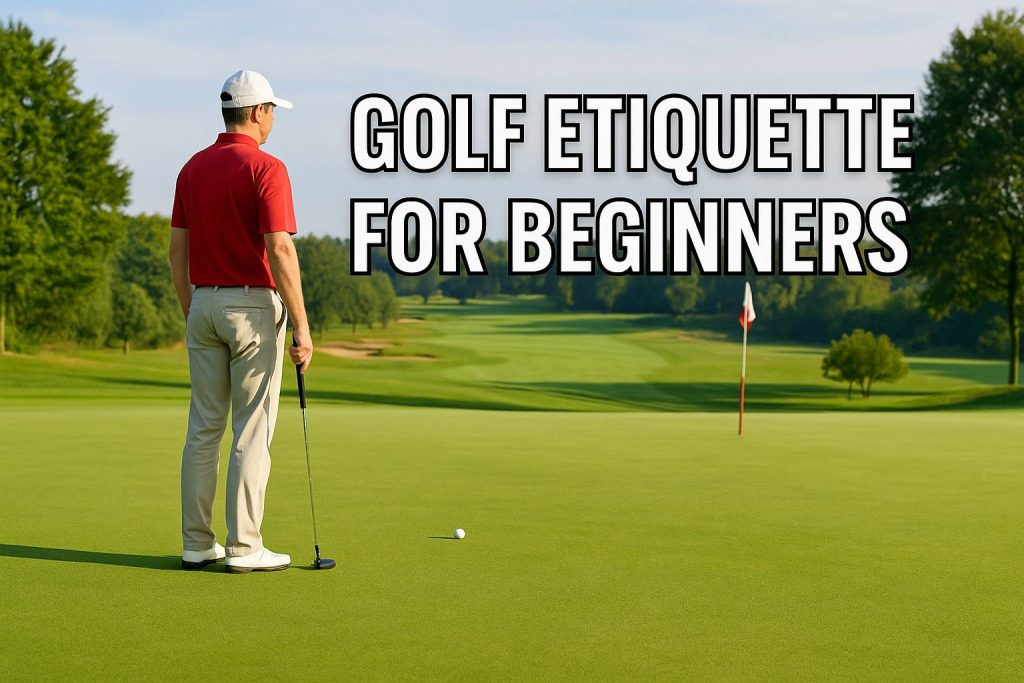Golf is a unique sport—not only in terms of technique and equipment but also in the etiquette that surrounds it. Unlike many other sports that are closely monitored by referees throughout the game, golf is often played without direct supervision. The integrity of the game relies heavily on honesty, sportsmanship, and mutual respect among players.
For beginners, understanding golf etiquette is just as important as learning how to swing a club. This knowledge helps create a pleasant playing environment, prevents potential conflicts on the course, and ensures that everyone enjoys the game. In this GoGolf article, we’ll cover the most important etiquette rules every beginner should know, with in-depth explanations and real-world examples.
1. Prioritizing Safety on the Course
Safety is the number one priority in golf. Despite its seemingly relaxed pace, golf involves powerful swings and small balls that can travel at speeds exceeding 150 km/h. Therefore, players must always ensure that no one is within striking distance before swinging the club.
Key safety measures include:
- Check Your Surroundings – Before making a swing, look left, right, and behind to ensure no players, caddies, or spectators are standing too close.
- Watch Players Ahead – Never take your shot until the group in front is at a safe distance beyond your range.
- Be Aware of Natural Hazards – Tree branches, small rocks, or loose objects can also be launched unintentionally during a swing.
A common example is when beginners rush their shots without checking the positions of others on the course—this can easily lead to serious injuries. By staying aware of those around you, you reduce the risk of accidents.
Safety also extends to equipment usage: ensure your grip isn’t slippery, the ball is in good condition, and you’re wearing proper golf shoes to avoid slipping.

2. Shouting “Fore” as a Warning
In golf, the word “Fore!” is a universal warning shout used to alert others that a ball is heading in their direction. Players are expected to yell “Fore!” loudly whenever a shot veers off course and could potentially strike another player or spectator.
Why is this so important? A golf ball, while small, can cause serious injury due to its speed and hardness. By shouting a warning, those in the ball’s path have a chance to duck or move out of the way.
This etiquette applies not only on the main course but also in driving ranges or practice areas. If your ball ricochets or travels in the wrong direction, shouting “Fore!” is a responsible act to protect others.
3. Respecting Other Players
Respecting fellow players is at the core of golf etiquette. In practice, this means:
- Avoiding Distractions – Don’t talk or make noise while someone is preparing to hit.
- Maintaining Distance – Stand clear of the player’s swing path and avoid standing directly in their line of sight.
- Turning Off Phones – Ringing phones or message notifications can ruin a player’s concentration.
Additionally, the player farthest from the hole typically hits first. This unwritten rule helps maintain a fair and orderly rhythm during play. Beginners unfamiliar with this custom should observe and learn from more experienced players.
Make golf booking effortless. Install GoGolf now!
4. Keeping Up with the Pace of Play
A steady pace of play is crucial for everyone’s enjoyment. Players who move too slowly can disrupt the rhythm of other groups, while overly fast play may pressure those who are still learning.
Tips for maintaining pace:
- Be Ready Before Your Turn – Have the correct club in hand and be positioned near your ball when it’s your turn.
- Avoid Excessive Preparation – While it’s fine to measure distance or take a few practice swings, do so efficiently.
- Handle Lost Balls Wisely – Don’t spend more than five minutes searching. Use a backup ball to keep the game moving.
If the group behind is playing faster, it’s courteous to let them play through. Doing so demonstrates sportsmanship and respect for everyone’s time.
5. Valuing Other People’s Time
Punctuality is a key component of golf etiquette. Arriving late doesn’t just inconvenience your group—it can throw off the course’s entire tee time schedule.
Here are some ways to respect others’ time:
- Arrive Early – Aim to be at the course 15–30 minutes before your tee time for warm-up.
- Avoid Last-Minute Cancellations – If you need to cancel, inform your group well in advance.
- Stick to Practice and Play Schedules – Discipline with time reflects professionalism, even among amateur players.
Being punctual shows appreciation for your fellow players, caddies, and course staff.
6. Taking Care of the Course
A golf course is a valuable facility that requires careful maintenance. As a player, you’re responsible for keeping it in good shape for others to enjoy.
Basic course care includes:
- Fixing Divots – After hitting the ball, replace or repair any turf you’ve torn up.
- Raking Bunkers – Smooth out any footprints or club marks after playing out of a sand trap.
- Repairing Ball Marks on Greens – Use a pitch mark repair tool to fix any indentations your ball creates on the green.
These simple actions show respect for the course and for other players. A well-maintained course ensures a better experience for everyone.
7. Maintaining Proper Appearance
Your appearance on the golf course isn’t just about style—it reflects professionalism and respect for the game. Most golf clubs enforce a dress code, which players are expected to follow.
Typical dress code requirements include:
- Collared Shirts – Projecting a neat and formal look.
- Golf Pants or Tailored Shorts – Jeans are usually not allowed.
- Golf Shoes with Soft Spikes – Protect the turf and offer better grip.
Staying clean and tidy—such as wearing clean shoes and pressed clothing—leaves a positive impression on fellow players and course staff alike.
8. Ending with a Positive Attitude
Understanding golf etiquette is the first step toward truly enjoying the game. Playing alongside experienced golfers also presents a valuable opportunity to learn—not just about technique but about behavior on the course.
Always remember: golf is not just about scoring—it’s also about the experience, the social interactions, and the values of respect and sportsmanship. By practicing proper etiquette, beginners not only enhance their playing skills but also build a solid reputation within the golfing community.
[ Follow our social media Account: GoGolf Instagram | GoGolf Facebook | GoGolf X ]










